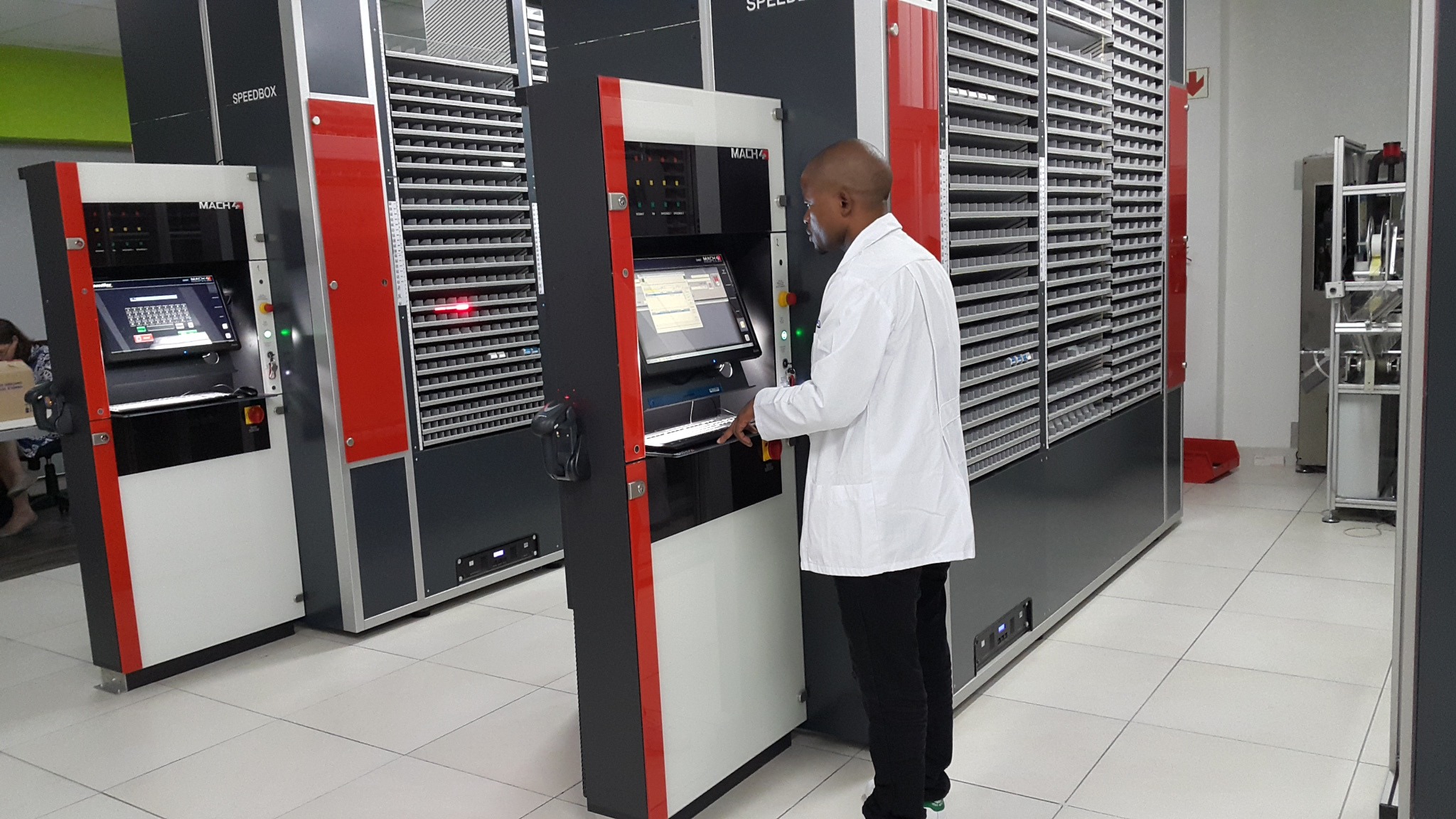
A groundbreaking ‘ATM pharmacy: Pharmacy Dispensing Unit’ that gives patients with chronic illnesses their repeat medication in under three minutes was officially opened in Alexandra today.
The innovative Pharmacy Dispensing Unit™ (PDU™) is the first of its kind in Africa and was developed by a team comprising experts from Right to Care and Right ePharmacy in collaboration with the Gauteng Department of Health. The Pharmacy Dispensing Unit™ (PDU™) works like an ATM for medication, with Skype-like audio-visual interaction between patient and tele-pharmacists, cloud based electronic software and robotic technology to dispense and label medication.
Right to Care CEO, Professor Ian Sanne says, “Our partnerships made this innovation possible and we are grateful to the Gauteng Provincial Health Department and for the contributions of USAID, GIZ who are implementing on behalf of the German Government and Mach4.
The PDUTM was developed to ensure accurate dispensing and quick collection. A clinically stable patient on chronic medication can be given the option to collect chronic prescriptions from the PDUTM pharmacy. While driven by sophisticated technology, patients’ concerns and information needs are still handled one-on-one by tele-pharmacists.
“Alexandra Plaza, where our first PDU™ is located, is a central community shopping centre which is on transport routes and it is open on weekends and public holidays. Sites in Diepsloot and two sites in Soweto have also been selected for the pilot of this public pharmacy programme.”
Gauteng Health MEC, Gwen Ramokgopa, says, “This is a great step forward for patients in our city as it dramatically reduces waiting times and congestion in public healthcare facilities. In Alex, there are eight primary healthcare clinics in the vicinity which refer patients.
“The system is run by qualified pharmacists and pharmacy assistants and integrates with the clinical management of patients with chronic conditions at public facilities. It also supports adherence. The date for the next collection is shown on the receipt the patient receives when collecting medication and prescription collection reminders are sent by SMS. Late collections are immediately flagged for follow up. It also offers patients service in all eleven languages and there is support at the site to help patients deal with the technology.”
US Charge d’Affaires Jessica Lapenn explains, “This ATM-like approach to dispensing medication demonstrates innovative thinking to overcome challenges we encounter in ensuring people stay on HIV treatment or treatment for other chronic illnesses. We are pleased to have partnered with Right to Care on this and other innovations for people living with HIV. The Pharmacy Dispensing Unit is a unique solution that uses technology to move beyond traditional healthcare delivery. It is a wonderful example of commitment by the United States Government to the people of South Africa through PEPFAR to help create a safer, healthier, and brighter future for South Africans.”
“Improving access to medication is key,” said Klaus Streicher, Deputy Head of Mission at the German Embassy in Pretoria. “The PDU promises to significantly improve people’s ability to deal with their illnesses. The German government is pleased to be a part of this multi-stakeholder partnership which brings together government, international donors and the private sector.”
Medicine is dispensed in a simple 5-step process:
- Patient scans barcode ID book, ID card or pharmacy card and enters PIN
- Patient talks to a remote pharmacist
- The prescription and or items are selected
- The medicine is robotically dispensed and labelled and drops in the collection slot
- Patient takes receipt which indicates next collection date.
Fanie Hendriksz, managing director of Right ePharmacy comments, “This pharmacy enhances access to quality pharmaceutical services and improves patient convenience. The early benefits have shown valuable patient and community data trends that are needed to improve patient outcomes. The technology is making it easier for people with various illnesses to have access to medication, ultimately improving adherence.”


